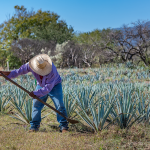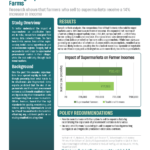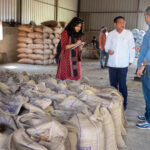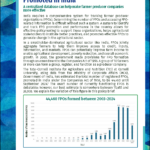Tag: Markets & Value Chains

New Project Promotes Diverse Food Value Chains in India
In a food system, growing crops isn’t the end of the story; it’s not even the beginning. Before crops can be grown, seeds and other inputs must be purchased. After the harvest, crops may be processed or refined before moving…

Conference to Support FPOs in Latin America
The Tata-Cornell Institute for Agriculture and Nutrition (TCI) is co-organizing and cosponsoring a hemispheric conference in support of farmer producer organizations (FPOs) in Latin America. “Smallholder Producer Organizations as Business Entities in Latin America: Scope, Challenges and the Road Ahead”…

Weighing the Price of Oil Palm in Nagaland
David (name changed) is one of the few Naga farmers who actually works his farm, where he grows oil palm. Most other landowners appoint “caretakers” to look over their land. David is also a part-time social worker and a grassroots…

Behind the App: Life as a Gig Worker in India
“Is this Ms. Sunita speaking?” I asked, trying to keep my voice steady. After her quick confirmation, I explained that I was outside with her order—somewhere near the intersection of her residential colony, though the app’s location marker danced uncertainly…

Making Supermarkets Profitable for India’s Small Farms
This policy brief presents the results of a study examining the impact of supermarkets on smallholder farmers in India. Using field survey data collected from 795 farm households across four states representing India’s varied agroclimatic and socioeconomic regions, researchers found that farmers who sold to...

TCI Publishes 2023–24 Annual Report
The Tata-Cornell Institute for Agriculture and Nutrition (TCI) has published its 2023–24 Annual Report.
The report offers an in-depth look at the full range of TCI’s research and other activities, including projects like Zero-Hunger, Zero-Carbon Food Systems, and field research…

Do Supermarkets Help India’s Small Farmers? It Depends.
When supermarkets first began spreading across India, they brought hope that smallholder farmers could make more money by selling them fresh, high-quality produce. Decades later, has that benefit materialized?
New research from the Tata-Cornell Institute for Agriculture and Nutrition (TCI)…

Determinants and Income Effects of Small Farmers Selling to Supermarkets versus Traditional Market Channels in Four Regions of India
Abstract Read a policy brief based on this study. Using endogenous switching regressions to calculate transitional heterogeneity which we have used to build counterfactual scenarios to identify the treatment effects for both sellers to supermarkets and sellers to traditional markets, the results support neither a...

FPOs Would Get Boost from Centralized Database
India is betting big on farmer producer organizations (FPOs) to boost its agricultural sector and improve the livelihoods of smallholder farmers, but its efforts would be enhanced by the creation of a centralized system of tracking FPOs, according to the…

Identifying the Number of FPOs Promoted in India
This special policy brief provides an estimate of the number of active farmer producer organizations (FPOs) promoted in India from 2003 to 2024 and makes the case for a centralized system for tracking FPOs. A system to identify and track FPO promotion and performance in...

